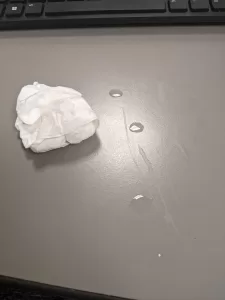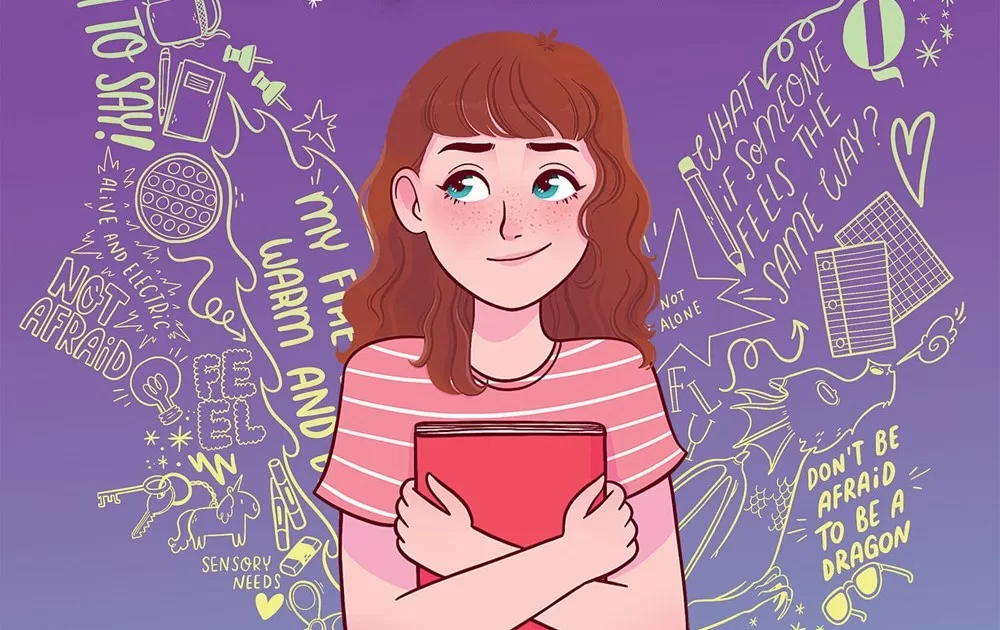“I ran,
locked myself
in one of the changing stalls.
Mom banged on the door
but I balled up on the dirty
tile floor
and cried
and hyperventilated
till my head stopped spinning
and my eyes dried
enough for me to see.
But when I calmed down,
Mom said,
“Selah Godfrey,
never ever cry
in the middle of a store.
Always hold it in
till you make it back to the car.”
That became
the first rule
for my list
on how to be
a Normal
This is from the first pages of “Good Different” and immediately sets itself apart from what I expected. When I was Selah’s age, 13, over two decades ago, autism was never spoken about in the classroom. Or any conversation really And there were no neurodiverse books from my recollection. I didn’t have a clear idea of what it was, just that I should be glad I didn’t have it. It was taboo and looked down upon, and I didn’t know anyone who had it. Or at least, shared with me that they have it. It was a mysterious, shame ridden condition that I unfortunately never tried to learn about.
Yet this amazing book will start many much needed conversations and diagnoses. The above opener made me realize how I had my own rules to be a Normal person:
- Please everyone even at the cost of yourself
- Don’t talk about how you really feel or you’ll make others uncomfortable
- Be nice even if they hurt you or make you cry
- Be quiet, you have nothing to offer.
Some of these rules I dropped, but some ultimately remained to my detriment. Who doesn’t maintain some sort of code to keep themselves in line with society? Under late stage capitalism, we all suffer under what we believe should be decorum and proper behavior, even when we know we need more for ourselves.
Who hasn’t tried to hide their real selves out of fear of being ostracized and ridiculed?
“Good Different” is a novel-in-verse where it’s told in a poem format with titles rather than the usual long-form chapters and paragraphs. Kuyatt uses the form extremely well, showcasing Selah’s thought processes, the breakdowns in communication, and highlighting deep breaths of emotion and huge moments. Sometimes a few stanzas can evoke so much more than a lengthy, drawn out chapter in a literary novel. Especially of note are the striking metaphors and similes that illustrate Selah’s struggles, such as “Hugs from strangers burn like blacktop on a sunny day.” I may not have firsthand experience of her extreme sensitivities but I can definitely clearly picture it.
Selah has an incident with a student and hits them, causing students and adults to disdain her. Her worst fear was to harm someone and the whole reason why she had those rules in the first place. Labeled as a danger and a freak, she questions her worth and place at Pebblecreek Academy which she has attended for eight years. She has always struggled with knowing herself and her limits, but through the course of the book, she discovers writing poetry and learns she’s autistic.
What’s noteworthy is we see Selah as a young girl who feels a lot, which goes against the harmful stereotype of autistic people being unfeeling, emotionless robots. Already an avid artist, she begins to write poems as an outlet and a way to connect with others in such a striking and intimate way. It made me want to pick up my own pen and write to my own loved ones about topics that are hard to talk about. I would not be surprised if readers—both adults and middle graders—start to write more creatively for themselves and others.

During the lulls at work, I was completely devoted to “Good Different” so much that I sobbed hard multiple times all over my desk. The way relationships and hurts were displayed that are just like my own, especially the fears, self-loathing, and self-doubts. But most of all, seeing how everyone grows. I couldn’t help but feel protective over Selah and her family, just wanting her to be accepted and loved for the amazing and caring person she is. I’m getting teary eyed now simply recalling it.
It’s absolutely wonderful the way Kuyatt introduces autism into Selah’s world. As Selah learns more about her condition, she becomes stronger and more forthright about her needs and desires, when she used to suppress. It’s inspiring to see how she advocates for herself and those around her and it made me want to be more vocal in my own life.
I was surprised to see how much I connected to Selah, from normal person rules, niche interests my family and friends don’t share, huge love for writing, not understanding jokes, withdrawing from social crowds, daydreaming, etc. It made me wonder if I am autistic myself and Kuyatt helpfully provided resources in her author’s note and on her website. Two of note are NeuroClastic’s “‘It’s a Spectrum’ Doesn’t Mean What You Think” and Autastic’s “List of Autistic Traits”, the latter focused on women. I learned a lot from these articles and I have a ton of common characteristics with that list. It was eerie how much it described my childhood up until now.
Witnessing Selah’s journey and knowing that the author Kuyatt is also autistic offered hope in my own life. They both wrote and shared how they truly felt, their struggles, their deep seated desires, their insecurities, their wishes for their loved ones. I am more motivated now to speak my truth and most importantly, be vocal when I need help and understanding. I love that Selah learns how her own needs are very important and should be met, regardless of how uncomfortable it may make others feel. Her quality of life is significant, as is everyone else’s, and it shouldn’t matter if the tools she requires may look strange to others.
I’m so happy I got to read this amazing and noteworthy book and I know it will help others, no matter their age, too. I definitely want to buy copies for my cousins, nieces, and nephews, and request a copy for my local library’s shelves. “Good Different” has impacted me so much that I want to talk to my therapist about getting diagnosed for autism. I already have been diagnosed with bipolar disorder and learning about those traits and how I can cope with it has helped me a great deal. As Kuyatt shows, learning that you’re autistic can be empowering and help you navigate the world so much better. It doesn’t have to be a scary process at all. And it can allow you to connect to others in a better, mutual fulfilling way.
I am grateful to Scholastic Press and Meg Eden Kuyatt for the review copy and the opportunity to see through Selah Godfrey’s eyes and her amazing heart. Thank you for teaching me how to be more fiercely kind with myself, and not let others dictate how I should act and be. “Good Different” is out now.

